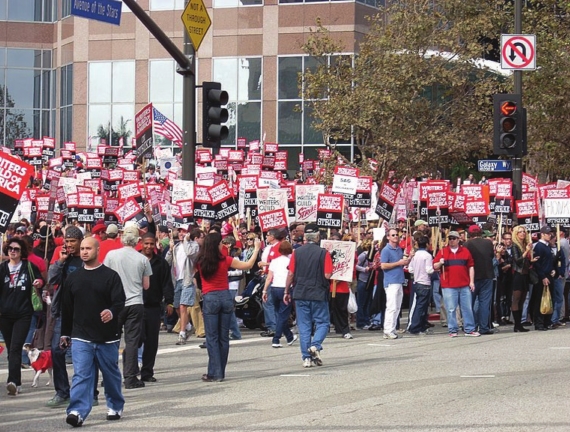
Striking film and TV writers walk the picket line.
Black writers fear recent film and TV job gains are at risk
LOS ANGELES—A number of popular television shows have been on perpetual reruns since the Writers Guild of America announced a strike May 2 against the Alliance of Motion Picture and Television Producers (AMPTP).
The East and West branches of the Writers Guild of America (WGA) represent 11,500 writers for television and film. Hundreds of writers and supporters are currently picketing outside of the traditional Hollywood studios of Disney, NBCUniversal, Paramount, Sony, Warner Bros. and the streaming services of Netflix and Amazon.
While the larger WGA West takes the streets in front of studios in and around Los Angeles, WGA East has been concentrating on shows in production. That means writing work has come to a halt on many TV shows, including “Evil,” “Stranger Things,” “Cobra Kai,” “Yellowjackets” and “Abbott Elementary,” among others. “Born Again” and “Billions” have been added to the list. “FBI: Most Wanted,” “P-Valley,” “Power Book II: Ghost” and “Pretty Little Liars: Summer School” temporarily shuttered production last week as East Coast scribes and their supporters took to the picket lines.
The work stoppage comes at a time Black writers and showrunners occupy more seats at the table. Black Americans account for 12.1% of the nation’s population, but filled 15.5% of the TV series writing jobs in 2020. This is a huge bump up, considering that 10 years ago, 92% of those jobs were controlled by white executive producers and showrunners.
“As a Black writer and member of the WGA, the strike has really impacted us, because for the first time there appears to be a greater openness to the range and breadth of Black stories,” said WGA member Lisa Jones Gentry, who has writing credits on TV shows and films.
“But difficult as the strike is, particularly where it may disproportionately affect writers of color who are only now being seated at the table in greater numbers, sometimes there has to be short term pain to accomplish longer term gain,” Gentry added. “If you look back at other strikes that came at a critical juncture in the business, for instance, when the WGA was able to extend jurisdiction over the digital and streaming platforms at a time when no one really knew their potential — imagine if they had not.”
Gentry noted the use of artificial intelligence is one of the big issues in contract negotiations.
“Only human beings can write valid scripts, not AI,” she said, using the common acronym.
If the strike is prolonged, viewers will notice a dip in new TV series by the end of the year. Reality series and international shows will begin playing in heavy rotation. Soap operas, already an endangered genre, will run out of new episodes after a month.
Film studios work about a year in advance, so most of the movies scheduled for release this year have already been shot. Unions like SAG-AFTRA and the Teamsters have proven to be effective allies so far, as the Guild’s nationwide strike enters its third week.
The latest casualty could be the Tony Awards. Deadline.com has confirmed with sources close to the Tonys that the WGA has denied producers of the Tony Awards a requested strike waiver that would have allowed the broadcast to go on as scheduled June 11. The waiver denial could prove disastrous for the Broadway productions that count on the annual CBS broadcast for the national exposure crucial to ticket sales.
How all of this will play out for consumers is still speculative. But don’t count on any discounts on the cable or streaming service bills. Negotiations appear to be at a standstill, and most people on both sides of the table are expecting a long strike. Stay tuned.